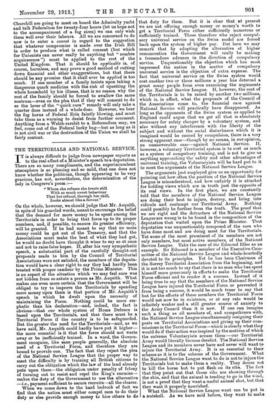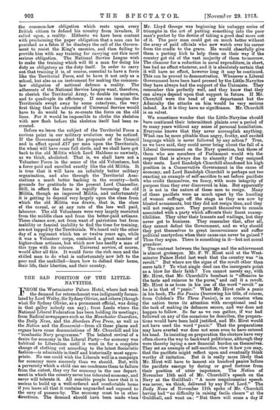THE TERRITORIALS AND NATIONAL SERVICE.
IT is always difficult to judge from newspaper reports as to the real effect of a Minister's speech to a deputation. There are so many compliments, and the superincumbent atmosphere is so pleasing and so mild, that one does not know whether the politician, though appearing to be very gracious, has not, nevertheless, the determination of the lady in Congreve's poem :— "Whom she refuses she treats still
With so much sweet behaviour That her refusal, through her skill, Looks almost like a favour."
On the whole, however, we should judge that Mr. Asquith, in spite of his guarded words, meant to encourage the belief that the demand for more money to be spent among the Territorials in order to bring that force up to its proper numbers, and, if possible, to ensure its greater efficiency, will be granted. If he had meant to say that no more money could be got out of the Treasury, and that the Associations must make the best of what they had got, he would no doubt have thought it wiser to say so at once and not to raise false hopes. If, after his very sympathetic speech, a substantial part of the carefully thought-out proposals made to him by the Council of Territorial Associations were not satisfied, the members of the deputa- tion would have a clear right to say they had hardly been treated with proper candour by the Prime Minister. This is an aspect of the situation which we may feel sure was not hidden from so astute a person as Mr. Asquith. What makes one even more certain that the Government will be obliged to try to improve the Territorials by spending more money upon them is that portion of Mr. Asquith's speech in which he dwelt upon the necessity of maintaining the Force. Nothing could be more em- phatic than his declaration—and, indeed, the fact is obvious—that our whole system of Home Defence is based upon the Territorials, and that there must be a Territorial Force if the country is to be safeguarded. But the greater the need for the Territorials—and, as we have said, Mr. Asquith could hardly have put it higher— the more essential is it that the force should not waste away or be inefficiently trained. In a word, the Govern- ment recognize, like sane people generally, the absolute need of a Territorial Force, and therefore they are bound to provide one. The fact that they reject the plea of the National Service League that the proper way to meet the difficulty is by training all British citizens to carry out the obligation which the law of the land already puts upon them—the obligation under penalty of felony of turning out to resist and repel the King's enemies— makes the duty of the Government to use the alternative —i.e., payment sufficient to secure recruits—all the clearer.
When we come down to the hard bedrock of fact we find that the nation must either compel men to do their duty or else provide enough money to hire others to do that duty for them. But it is clear that at present we are not offering enough money or money's worth to get a Territorial Force either sufficiently numerous or sufficiently trained. Those therefore who reject compul- sory universal service on the Swiss model are forced back upon the system of higher pay. But here we may remark that by adopting the alternative of higher remuneration the Government will really be making a tremendous advance in the direction of compulsory service. Unquestionably the objection which has most impressed the nation in the matter of compulsory universal service is the objection of extra expense. The fact that universal service on the Swiss system would cost another two or three millions a year has deterred a great many people from even examining the arguments of the National Service League. If, however, the cost of the Territorials is to be raised by another two millions, which is, in effect, what the proposals of the Council of the Associations come to, the financial case against National Service will practically have disappeared. As long as the opponents of the Swiss system as applied to England could argue that we get all that is absolutely necessary for safety cheaper by a voluntary system, and also without any interference with the liberty of the subject and without the social disturbance which it is imagined would be caused by compulsion, there is a very strong apparent case—though by no means, in our opinion, an unanswerable case—against National Service. If, however, a voluntary Territorial system is to cost as much as a system of compulsory training, and is not to give us azything approaching the safety and other advantages of universal training, the Voluntaryists will be hard put to it to meet the arguments of the National Service League.
The arguments just employed give us an opportunity for pointing out how often the position of the National Service League is misunderstood, and how unfairly it is attacked for holding views which are in truth just the opposite of its real views. In the first place, we are constantly told that the members of the National Service League are doing their best to injure, destroy, and bring into ridicule and contempt our Territorial Army. Nothing could possibly be further from the truth. The proof that we are right and the detractors of the National Service League are wrong is to be found in the composition of the deputation that waited upon the Prime Minister. That deputation was unquestionably composed of the men who have done most and are doing most for the Territorials. Yet some of the most prominent of its members are not only members, but most active members, of the National Service League. Take the case of Sir Edmond Elles as an example. Sir Edmond is a member of the Executive Com- mittee of the National Service League and whole-heartedly devoted to its principles. Yet he has been Chairman of the Surrey Territorial Association from the beginning, and it is not too much to say that there is no man who has spent himself more generously in efforts to make the Territorial Force efficient and to render it a success. Instead of it being true to say that the members of the National Service League have injured the Territorial Force or prevented it from being a success, it would be much truer to say that but for the efforts of those members the Territorial Force would not now be in existence, or at any rate would be infinitely weaker and a still greater source of anxiety to the Army Council than it is now. If one can imagine such a thing as all members of, and sympathizers with, the National Service League simultaneously resigning their posts on Territorial Associations and giving up their com- missions in the Territorial Force—which is clearly what they would do if their action was inspired by the motives of which the extreme Voluntaryists accuse them—our Territorial Army would literally become derelict. The National Service League and its members never have and never will want to injure the Territorial Army. It is as essential to their scheme as it is to the scheme of the Government. What the National Service League want to do is not to injure the Territorials but to make them a reality. They desire not to kill the horse but to put flesh on its ribs. The fact that they point out that those ribs are showing through the skin, and that the animal is tending to go in the wind, is not a proof that they want a useful animal shot, but that they want it properly nourished. What the National Service League want can be put in a nutshell. As we have said before, they want to make the common-law obligation which rests upon every British citizen to defend his country from invaders, if called upon, a reality. Hitherto wo have been content with proclaiming the paper obligation that a man can be punished as a felon if he disobeys the call of the Govern- ment to resist the King's enemies, and then failing to provide him with any training for carrying out this most serious obligation. The National Service League wish to make the training which will fit a man for doing his duty as obligatory as the duty itself. In order to carry out that training it is, of course, essential to have a force like the Territorial Force, and to have it not only as a school, but also as an instrument for making the common- law obligation of national defence a reality. The adherents of the National Service League want, therefore, to cherish the Territorial Army, to double its numbers, and to quadruple its efficiency. If one can imagine the Territorials swept away by some cataclysm, the very first thing that the advocates of Universal Service would have to do would be to re-create the force on the old lines. For it would be impossible to clothe the skeleton with new flesh before the skeleton itself had been re- created.
Before we leave the subject of the Territorial Force a curious point in our military evolution may be noticed. If the Government adopt the proposals of the Council and in effect spend £17 per man upon the Territorials, the wheel will have come full circle, and we shall have got back to the old Militia which Lord Haldane so unwisely, as we think, abolished. That is, we shall have not a Volunteer Force in the sense of the old Volunteers, but a force paid and enrolled exactly like the old Militia. It is true that it will have an infinitely better military organisation, and also through the Territorial Asso- ciations a much better backing in the country—both grounds for gratitude to the present Lord Chancellor. Still, in effect the force is rapidly becoming the old Militia, though an improved Militia, and unfortunately it is getting to depend very largely upon the class from which the old Militia was drawn, that is, the class of the casual, or at any rate of the less well paid, labourer. The old Volunteers were very largely recruited from the middle class and from the better-paid artisans. These classes now, not from 'want of patriotism but from inability or fancied inability to find the time for training, are not tapped by the Territorials. We heard only the other day of a regiment which ten or twelve years ago, while it was a Volunteer corps, contained a great number of higher-class artisans, but which now has hardly a man of this type with its colours. Universal service, of course, would alter all this. It would force the rich man and the skilled man to do what is unfortunately now left to the poor and the unskilled—learn how to defend their home, their life, their liberties, and their country.



















































 Previous page
Previous page